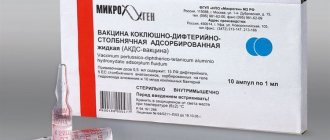In the first years of life, it is very important to pay close attention to the baby’s health. What kind of doctors do you undergo at 2 years old? This is important to know for all parents who want to save their child from health problems in the future, because it is in childhood that the development of many chronic diseases can be identified and prevented.
The information is provided on the basis of Order of the Ministry of Health of the Russian Federation dated December 21, 2012 No. 1346n “On the Procedure for undergoing medical examinations for minors, including upon admission to educational institutions and during the period of study in them”
What should a six-month-old child be able to do?
If you don’t want a trip to the doctor to turn into a series of surprises and unanswered questions, you can prepare for the event in advance. It is clear that all children develop differently, but there are points that are typical for all babies at the age of 6 months, which pediatricians and specialized doctors adhere to during examination:
- The baby's height should be from 61 to 62 cm, weight from 6.5 to 7.5 kg. These data are considered optimal, but it is necessary to take into account the characteristics of feeding the baby, the conditions of its maintenance, and heredity.
Advice: It will be easier for the doctor to establish the correctness and sequence of the baby’s development if the mother provides him with records of the dynamics of the baby’s height and weight. Every mother needs to keep a diary like this, making notes at least once a week.
- The child should roll and turn over, pull his legs up with his arms and raise his head towards them.
- At 6 months, children are already firmly holding toys of a suitable size, transferring them from one hand to another, and taking items from the hands of another person.
- Babies are able to hold things in each hand, shake them and knock.
- It’s good if a six-month-old baby can bend, leaning on his head and legs, stands on all fours and can crawl forward and backward a little.
- He is already trying to sit on his own, is interested in surrounding objects and reaches out to them.
- Some children at 6 months are already trying to stand with reliable support.
In addition, children at this age try to put everything in their mouths, know their name, distinguish between “us” and “strangers,” actively babble something, distinguish between the emotions and intonation of others. By six months, children should be actively interested in the world around them. If this does not happen, the cause may be not only slightly delayed development, but also psychosomatic factors.
How is the medical examination carried out?
Every minor child under 17 years of age has the right to a free medical examination.
- To undergo a medical examination, the child must be made an appointment with a local pediatrician.
- At the appointment, parents (or the child himself, if he is over 15 years old) will need to fill out informed voluntary consent
. The doctor will give recommendations on the procedure and write out referrals for tests and consultations with specialists. - If necessary, the local doctor may refer the minor for additional consultation or research.
Based on the results of the preventive examination, the doctor will determine the child’s health group and medical group for physical education.
Specialists that must be completed at 6 months of age
Parents need to not only know which specialists their children visit every six months, but also for what purpose this is done. First of all, babies go through a pediatrician who checks basic parameters (height, weight, circumference, basic skills). The doctor advises on the introduction of complementary foods and describes in detail the upcoming medical examination. After this, you need to visit the following doctors:
- Neurologist. Evaluates the general development of a child at 6 months, his motor activity, muscle tone, facial expressions and the adequacy of psycho-emotional reactions. It tests the disappearance of some innate reflexes and the acquisition of new essential skills. If questions arise, an ultrasound scan of the brain may be prescribed. This is an absolutely harmless procedure for the baby, which allows you to detect problems in time and carry out the necessary correction.
- Cardiologist. A visit to this specialist allows you to make sure that the baby does not have heart defects or circulatory disorders. Most often, the doctor limits himself to listening to heart rhythms using a phonendoscope and examining. Sometimes an additional ECG is performed.
- ENT. Checks the quality of the baby’s hearing, examines the mucous membranes of the mouth, ears, and nose for inflammatory and infectious processes.
- Orthopedic surgeon. Evaluates the quality of development of the musculoskeletal system, features of the development of muscles, joints and bones. If necessary, prescribe a set of exercises or massage for timely correction of problems.
- Ophthalmologist. It is at the age of 6 months that the optic discs begin to form in the newborn, and their maturity is established by examining the fundus of the eye. In addition, a visit to an ophthalmologist allows you to consult on the proper care of your baby’s eyes and receive recommendations on how to combat lacrimation, suppuration, and inflammation of the mucous membrane.
After going through all the doctors who have made the appropriate entries in the baby’s outpatient card, you can again visit the pediatrician, who will summarize all the points and make a conclusion on the child’s condition. Often you have to take additional tests (urine, blood, feces for worm eggs).
Routine medical examination at 2 years
As soon as the baby turns two years old, parents need to take him to specific doctors for a routine examination and undergo age-appropriate tests. In accordance with the doctor's recommendations, directions for each child are individual.
As you know, it is in the first years of life that a child’s immunity is formed, which will certainly affect further development and health in general. Therefore, doctors advise taking all routine examinations seriously and, as necessary, consulting with other specialists.
Vaccinations required for six-month-old children
Completion of the six-month medical examination marks the beginning of the third stage of vaccination. It is worth considering that vaccination is carried out only if the small fontanel is completely closed and the large one is significantly reduced. If before this all activities were carried out according to plan, then in the near future it is necessary to get vaccinated against whooping cough, diphtheria, hepatitis B, tetanus, and polio. If any vaccination is missed before this point, it must be completed. Scientists have proven that the risk of complications increases if the vaccination schedule is not followed, so it is better not to take risks.
EXAMPLES OF GAMES AND EXERCISES TO DEVELOP INTELLIGENCE IN CHILDREN
MARIA MONTESSORI'S EARLY CHILD DEVELOPMENT METHOD
First meeting with the doctor
While the baby is in the maternity hospital, a neonatologist monitors him. Immediately after the baby is born, the pediatrician will check:
- weight;
- height;
- chest and head circumference;
- innate reflexes;
- pulse and breathing;
- skin color and muscle tone.
Based on this check, the baby’s condition will be assessed on a ten-point Apgar scale. If the child scores less than 7 points, then there is some kind of health problem and the baby will need intensive care. In the following days, the doctor will examine the baby daily and, if necessary, prescribe the necessary additional examinations.
After discharge from the hospital, wait for a home visit from the pediatrician. During the first month, he will come to you 3 times, examine the child and give the necessary advice on care. This method of monitoring a child is called patronage.
Feature article:
- How to treat a newborn's navel
"Mandatory program"
Each appointment with a local pediatrician includes several mandatory items. The baby will certainly be weighed, his height, head and chest circumference will be measured. Even these routine tests will give the doctor a lot of useful information and will allow him to determine whether your treasure is developing correctly. In addition, the doctor will examine various organs and systems of the body, listen to the baby’s breathing and heartbeat, feel the tummy, and look into the neck. He will definitely take an interest in the features of feeding the baby and give the necessary recommendations.
Perhaps the doctor will consider it necessary to give you a referral for a series of tests - ask about the rules and “subtleties” of taking them. Most often, children are sent for a general (in this case, blood is taken from a finger), general urine test, and scatological examination (stool analysis). If the doctor is concerned about something in the baby’s condition, he can give directions for more complex studies: a biochemical blood test (in this case, blood must be taken from a vein), a stool examination for microflora. Among the instrumental techniques, ultrasound of the abdominal cavity and brain can be prescribed (this study - sonography - is carried out through the large one on the crown), radiography. If your child needs more serious tests, the doctor will tell you where they can be done.
Most likely, your doctor will recommend that you visit the “well baby room.” This is the name of a special office in the clinic where children under 3 years old who do not attend preschool institutions come. There, specialists will assess whether the baby is developing correctly, show gymnastics and massage techniques, and answer questions regarding the baby’s nutrition. In the same office you can get a vitamin D solution for free (usually with a referral from your local pediatrician) for the prevention and treatment of rickets.
Who does the clinic serve?
If all children are provided with nursing care during the first month of life, regardless of whether they have an insurance policy, then an insurance policy is required for subsequent observation in a children's clinic. It is issued at a special point at the place of registration (usually such points operate at a district children's or adult clinic). To apply for a policy, you will need a child’s birth certificate with a registration stamp (placed at the housing office) and the passport of the parent in whose living space the baby is registered. After receiving the policy, it must be registered at the children's clinic. If you want to be observed in a clinic at the place of actual residence of the child, which does not coincide with the registration address, you must write an application addressed to the head physician of this clinic and re-register the policy at the new address.
For nonresident residents without a Moscow compulsory medical insurance policy, emergency medical care (on call “03”) is provided regardless of the availability of an insurance policy and registration.
Visits to specialists and vaccinations
In addition, your local pediatrician will give you referrals to specialists and for routine vaccinations. When the baby is one month old, he will have to visit a neurologist, surgeon and orthopedist for the first time. Don't be surprised if they schedule a follow-up visit for you at 3 months: this age is another milestone in your baby's development, and you need to be sure that he is developing correctly. At 3 months of age, you will also need to visit your ophthalmologist. Perhaps the local pediatrician will recommend that your child be examined by other specialists.
As for vaccinations, your baby has most likely already received the first of them in the maternity hospital (vaccine to prevent tuberculosis and vaccination against hepatitis B). At the age of 1 month, it is necessary to revaccinate against hepatitis B. At three months, it will be the turn of vaccination against whooping cough, tetanus and (vaccine), polio. These vaccines are administered three times with a break of one and a half months - at 3, 4.5 and 6 months; the last, third, administration will coincide with the second revaccination against hepatitis B.
When the baby turns one year old, he must be examined by all specialists (neurologist, orthopedist, surgeon, ophthalmologist, otolaryngologist), including a pediatric dentist. In addition, at this time, routine tests are taken (blood, urine, stool) and for the first time a test is performed that reveals the level of immunity to tuberculosis.
What kind of doctors do you undergo at 3 months?
The baby will be examined again by a pediatrician, neurologist and orthopedist at 3 months.
- The pediatrician examines the baby according to the usual procedure and sends him for vaccination against diphtheria, whooping cough, tetanus (DPT) and polio.
- By this time, acquired reflexes replace innate reflexes. They are checked by a neurologist. The child should already be able to confidently hold his head, lift it while lying on his stomach, respond to close people and try to grab toys. The doctor will definitely recommend a massage to relieve hypertonicity in the baby’s muscles.
- At three months, the baby is actively developing motor skills. Therefore, consultation with an orthopedist is so important during this period. The doctor will again evaluate the functioning of the hip joints and the entire musculoskeletal system as a whole.
In a three-month-old baby, it is important to exclude the development of rickets, which often occurs during periods of rapid growth and is associated with a lack of vitamin D and metabolic disorders. This disease leads to skeletal deformation, making bones fragile and muscles weak, undermines the baby’s immune system and severely inhibits its development.
When should you contact a pediatrician?
Your pediatrician can answer almost any questions you have about your baby. At a routine visit to your pediatrician, you can get advice on issues such as:
- Skin problems including dryness, rashes and diaper irritation.
- Feeding problems
- Child behavior - from sleep problems to children's tantrums.
- How the child develops, including his, and.
- Digestive problems
- Teething
You should consult a doctor immediately if your child:
- Severe pain that does not go away even after taking children's paracetamol or ibuprofen.
- He feels so bad that he cannot eat or drink.
- Breathing problems; the child does not answer questions - or you cannot wake him up.
- Suddenly a rash appeared, covering the body completely or partially.
- The temperature has risen sharply, which does not decrease after taking children's paracetamol or ibuprofen.
Has your baby turned one month old? Among other things, this first “little” birthday separates the period of foster care for the baby from the stage when the baby himself becomes a visitor to the children's clinic. Yes, yes, at the age of one month you and your baby will be invited to your first visit to your local pediatrician.
How often and when to visit a pediatrician?
A child of the first year of life should visit a local pediatrician monthly. In addition, when it is time for the next vaccination, the local nurse will call you to remind you about it.
Most often, the work of a children's clinic is organized in such a way that a special day is allocated when mostly healthy children of the first year of life come for an appointment - such a day is affectionately called “infant day”. When visiting a clinic on these days, the risk of contact with sick children and transmission of infection is much lower. In addition, many clinics have special days when children registered at the dispensary come for appointments.
What your doctor will want to know
- Has the child been seen by another doctor since the last visit? If yes, what was the reason? What was the result of this examination, were any medications or procedures prescribed?
- Can a child sit well without support? Can he twist and turn while sitting? How easy does it sit down?
- Is he already crawling or starting to crawl? Attempts to get on all fours, movements with jerks and pushes - everything counts.
- Can the child pull himself up and stand up on his own?
- Can he pinch small objects between his thumb and forefinger?
- Can he eat with his fingers?
- Does he point at objects with his index finger?
- Does he get nervous in the presence of strangers?
- Does the child already say “mom” or “dad”?
- What games does he know (“peek-a-boo”, okay, waving “bye-bye”, etc.)? What are your child’s favorite toys and how does he play with them? Does it shake, make you spring, drop, throw?
- Does the child already have his first teeth? At this age, children may already have upper and lower incisors.
- Does the child respond to his name?
- Recognize some words?











